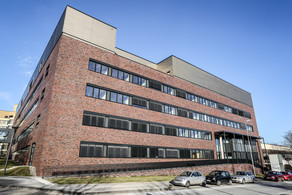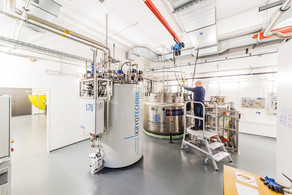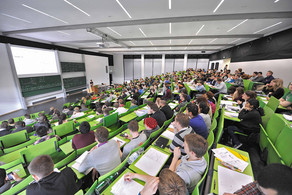The first two semesters
Organisation of the studies
For many first-year students, the start of a physics degree program means a change in habits compared to school. In addition to the lecture formats typical of the university, the department offers a wide range of exercises in which students apply the theoretical knowledge they have gained to concrete problems and work on them, sometimes in small groups.
Lectures
In lectures, all students of a year are taught new contents of the respective topic by lecturers in a lecture hall (usually for 90 minutes). Although questions are of course always welcome, mutual communication is the exception here, unlike what you are used to at school. The density of the material taught in lectures is also much greater than in school. Very few people therefore understand 100% of the material in a lecture just by attending it. It is therefore essential to work through all lecture notes thoroughly, possibly also with the help of other sources.
Exercise sheets and exercise groups
Especially in the physics and mathematics lectures, it is important to apply the knowledge acquired in lectures to concrete problems. For this purpose, you will receive a sheet with exercises every week, which you have one week to solve. The exercises are then discussed in exercise groups of about 20-30 students. The exercise groups in the first two semesters are usually led by two Bachelor students from higher semesters. A regular solving of exercises is very important in order to be able to successfully complete the module examinations at the end of the semester.
Tutorials and Helpdesks
In order to make the transition from school to university as easy as possible for you, there are tutorials in the first two semesters, which are voluntary and in which all topics that concern you can be discussed. The tutorials are also led by Bachelor students from higher semesters.
For the winter semester 2021/22, the Department is planning to set up help desks for the first time, which will be offered several times a week and where more experienced teaching staff can help you spontaneously with questions and problems.
Examinations
There are two types of examinations for most courses ("modules") in your degree programme, the "Studienleistung" and the "Module examination".
"Studienleistungen"
In most courses, you acquire the "Studienleistung" by regularly submitting a sufficient number of correctly completed exercises. The "Studienleistung" is not graded at the end of the 15-week lecture period, but you must pass it in order to register for the module examination.
Module examinations
In most courses, the module examinations are graded (2- or 3-hour) written examinations at the end (or after the end) of the lecture period. In the modules Physics I and Physics II there is usually also an intermediate exam after half of the lecture period. In order to take into account the very different school requirements, the module examinations of the first semester are not graded, but only have to be passed.
Important electronic platforms
There are currently three main electronic platforms at TU Dortmund University for organising your studies. Electronic registration for all portals of the TU Dortmund University is done via the access data that you receive from the ITMC after enrolment.
lsf
All basic information (where, when, who, ...) on the courses relevant to your studies can be found on the lsf portal. Registration for courses is usually done via lsf or via the Moodle learning platform.
Moodle
Moodle is a versatile learning platform that is used for most courses at TU Dortmund University. Every course in which moodle is used has its own "Moodle room" there. You can either find it using the search function under Moodle or by clicking on the Moodle link that can be found in lsf for the corresponding course. However, this link only exists if the lecturer has set it up, which is not always the case.
BOSS
Registration for and grading of examinations is managed via the BOSS system. BOSS is relevant for you because you can register for "Studienleisungen" and module exams there.
Both lsf and BOSS will be replaced in the summer semester 2025 by a more modern campus management system that combines both functions.








